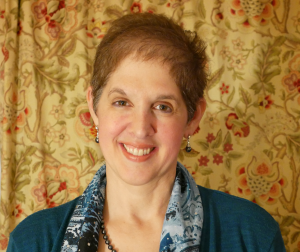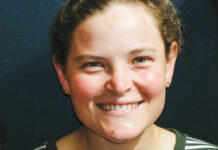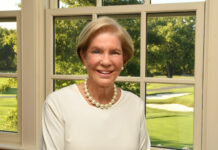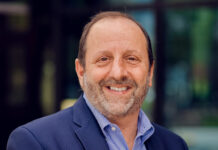Valerie Thaler earned a Ph.D. in Jewish history from Yale University in 2008 and is now executive director of Congregation Beth Israel in Owings Mills.

She works with every aspect of synagogue life to help the Conservative congregation carry out its programs, maintain its membership and keep the operation running for its 375 mostly older members and its 40-student religious school for children.
In this job since 2019 — and the ones that preceded it — Thaler, 50, has observed trends that convey challenges for Jewish institutional life in America.
For one, more congregants are opting to stay home and tune in via Zoom, less because of the coronavirus and more for convenience. “Certainly, there are those who are uncomfortable being around others because of the fear of the virus, but others are actually just opting to join in from home, whether it be services or classes,” she says.
For example, a recent learning program the synagogue gave drew an audience that was 75% remote and 25% in person. Attendance at services runs half and half.
“Synagogues everywhere are facing this challenge,” says Thaler of Reisterstown. “It’s really tough to create community when people are not together. You have to invest in technology in a way that you didn’t have to before COVID. You have connectivity, you have microphones, you have screen-sharing. I know a lot of synagogues are struggling to navigate that new reality.
She says “certain elements of COVID life are here to stay, even though there are some experiences that are simply easier to have in person.” Eating is one them, she points out.
Synagogue security is more complex these days, notes Thaler, ever since the Tree of Life synagogue mass shooting in Pittsburgh in October 2018. “We have a large budget for security guards and grants from the federal government that we are using to upgrade our security infrastructure. If you go past a church, you don’t see any of that. They are just open, and you can walk into them. We can’t ever take that approach.”
Declining affiliation is a long-standing problem for many synagogues, says Thaler, whose own synagogue retains less than half the members it had in the early 2000s. “I think many synagogues are figuring out how we create meaning for people so they want to join or feel part of the community,” she explains. She is a member of Beth Israel, and her spiritual beliefs land somewhere between Conservative and Reform.
“A generation or two ago, people felt that joining a synagogue was something you simply did. Today, many younger people don’t feel compelled to. They want to come to programs once or twice, à la carte, but they’re not interested in creating long-term relationships with institutions.”
Parents don’t feel a need for a synagogue beyond their youngest child’s bar or bit mitzvah, she says, “so they move on. The synagogue is not relevant to them.”
One of the reasons behind dropping out of synagogue life is the cost: “It’s really expensive to be part of Jewish institutional life. It’s often the case that we are competing with many other priorities that families have on their plates.”
‘enjoy working with people’
Originally from suburban Philadelphia, Thaler began her education as an American-studies major at Yale. She grew interested in Jewish education after a year-long stay in Israel. She studied at Pardes Institute of Jewish Studies, a liberal yeshivah in Jerusalem that draws many Americans and Canadians. She also studied and evaluated Holocaust public-school curriculum for Yad Vashem, the Holocaust memorial museum in Jerusalem.
Upon her return, she earned a master’s degree at Brandeis University in Jewish education and Judaic studies. Her Ph.D. dissertation at Yale examined American Jewish identity in the post-World War II era.
In 2008, Thaler moved to Baltimore, where she became an assistant professor of American Jewish studies at Baltimore Hebrew University in Pikesville. The institution was soon absorbed by Towson University after 90 years of teaching academics and future Jewish communal professionals. Thaler became a history and then a family-studies professor at Towson.
Off her original academic path, she eventually left academia and took a job at Beth Tfiloh Dahan Community School in Pikesville, teaching high school Jewish history. Her husband, Alex, is a science teacher at Krieger Schechter Day School of Chizuk Amuno Congregation.
She also held a smattering of freelance jobs in the Jewish community, including helping to update the core exhibit at the Jewish Museum of Maryland in Baltimore.
In 2017, she began her career as a synagogue professional, first working as the administrator at Har Sinai, a Reform congregation in Owings Mills. Two years later, she left to become the administrator at Beth Israel.
Thaler’s varied career path, both in and out of academia, has always focused on building Jewish life. “Even though I feel pretty far from where I started in terms of my training,” she says, “I really enjoy working with people, and I love creating and strengthening vibrant Jewish communities.”







